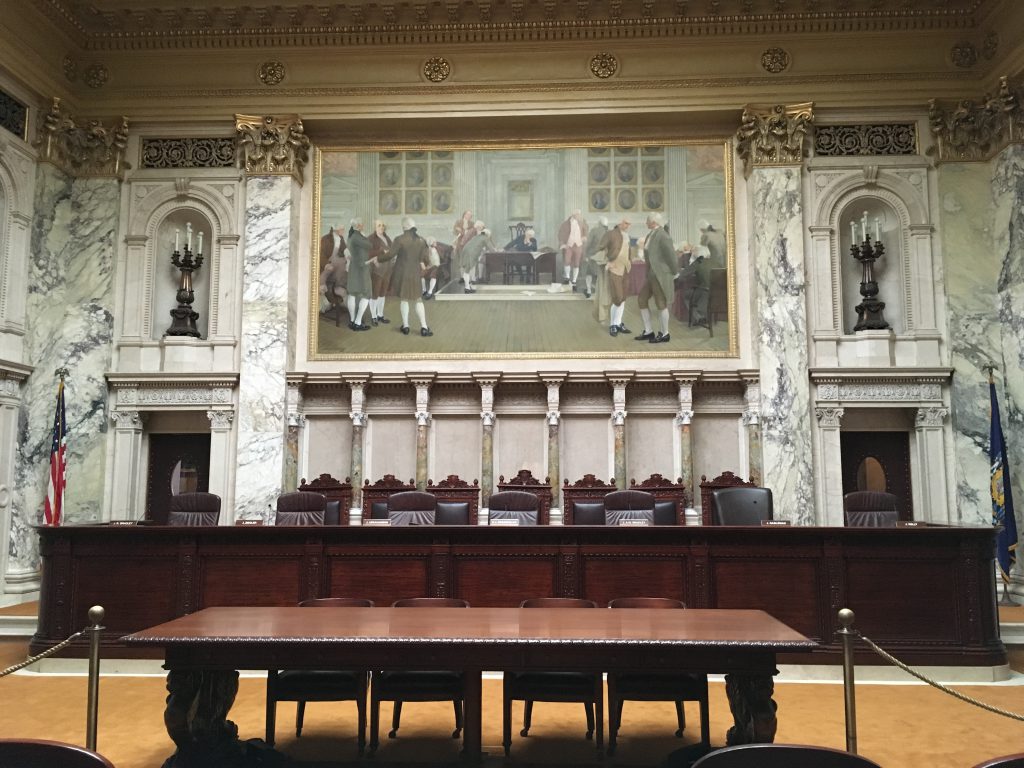Wisconsin Supreme Court Consultants Rule Out Republican-Drawn Maps
In first public release, court consultants say GOP maps "don't deserve further consideration."
Two consultants hired by the Wisconsin Supreme Court’s liberal majority say redistricting plans submitted by the Republican-controlled Legislature do “not deserve further consideration” by justices as part of an ongoing lawsuit over the state’s political maps.
Their report on six map proposals says plans submitted by Gov. Tony Evers, Democrats and academics are “tilted toward the Republicans” but are competitive enough that “the party that wins the most votes will win the most seats.”
The findings, released to the court Thursday night, struck at the heart of an argument long used by Republicans that Wisconsin’s “political geography” favors their party because Democrats are generally clustered in larger cities. Wisconsin’s current legislative maps, first drawn by Republicans in 2011 and redrawn in 2021, have helped the GOP cement lopsided majorities in the Assembly and Senate, even in years when Democratic candidates performed well statewide.
But University of California, Irvine Political Scientist Bernard Grofman and Carnegie Mellon University Political Scientist Jonathan Cervas told the court that the maps submitted to the court contradicted that claim.
“To put it simply, in Wisconsin, geography is not destiny,” they wrote. The report argues map proposals from every party except the Legislature and voters represented by the conservative Wisconsin Institute for Law and Liberty are able to “improve on traditional good government criteria compared to the current map and manage to create plans with modest levels of partisan bias.” Also, the consultants wrote, the Legislature’s plan and the plan submitted by WILL “are partisan gerrymanders” from a social science perspective. The other four plans, the report said, are similar on most criteria.
The consultants did not endorse a specific map but told the court they were prepared to improve map proposals if justices choose.
Shortly after the report was released, Evers called it an important step in the process for finding new maps.
“The days of Wisconsinites living under some of the most gerrymandered maps in the country are numbered,” Evers said.
WILL President and General Counsel Rick Esenberg released a statement slamming the report, accusing the experts of hiding their own preferences.
“The report hides its bias behind a fog of faux sophistication,” read the statement from Esenberg.
Redistricting consultants: Who are they?
Grofman and Cervas were appointed to serve as consultants to the court in late December.
Their task: vet the six map proposals submitted to the court against redistricting criteria outlined by the liberal majority in late December. Those include constitutional requirements that legislative districts be as compact as possible, include similar populations and have boundaries that physically connect. They also included a new “partisan impact” requirement.
Grofman and Cervas have done similar work for courts around the U.S. in recent years
Grofman worked for Wisconsin Republicans during two previous rounds of Redistricting in 2011 and 2001. More recently, he was hired by the Supreme Court of Virginia in 2021 to help redraw legislative districts after a bipartisan commission couldn’t agree on how lines should be drawn.
Cervas was hired last year by a New York State judge as a special master to draw new legislative districts following a lawsuit filed by state Republicans.
Contracts with the Wisconsin’s Supreme Court show they’ll each be paid up to $100,000 for their services.
Why is the Supreme Court considering new voting maps?
In a bombshell ruling issued Dec. 22, the Supreme Court’s liberal majority declared current Republican-drawn maps violate the Wisconsin Constitution’s requirement that districts must be contiguous and ordered parties in the redistricting lawsuit to submit new map proposals.In that December ruling, the court’s conservative justices issued three separate dissenting opinions accusing their liberal colleagues of diving “headlong into politics” and being “handmaidens of the Democratic Party” who were undermining the integrity of the court.
‘Partisan impact’ vs. ‘least changes’
Democratic voters who filed the legislative redistricting lawsuit asked the Supreme Court to rule on whether current GOP-drawn maps were so heavily tilted toward Republicans that Democrats would never be able to gain a majority in the state Assembly and state Senate. They argued that partisan gerrymander violated their rights under the U.S. Constitution.Justices didn’t take up the gerrymandering claim in their December ruling, but the court’s liberal majority said it would consider “partisan impact” when picking new maps. Writing for the majority, Justice Jill Karofsky said the court would “take care to avoid selecting remedial maps designed to advantage one political party over another.” Still, Karofsky said, it’s impossible for the court “to remain neutral and independent by failing to consider partisan impact entirely.”Again, the conservative justices were highly critical of the decision to consider partisanship at all. Justice Rebecca Bradley went so far as to say there’s no legal foundation for considering partisan impact and it would enable “the majority to engage in a purely political exercise.”
GOP lawmakers passed new maps in 24 hours, which were vetoed by Gov. Tony Evers
In a last minute attempt to enact new maps as the redistricting lawsuit draws to a close, Republican lawmakers amended a nonpartisan redistricting bill to include versions of maps they claimed Evers submitted to the court. Assembly Speaker Robin Vos, R-Rochester, said their version was nearly identical with “miniscule changes to un-gerrymander” what Evers sent to the court. The changes were aimed at reducing the number of GOP incumbents who would be drawn out of their districts under the governor’s proposal.
Evers vetoed the bill calling the Republican maps “gerrymandered” to protect GOP incumbents.
The maps passed by the Legislature and vetoed by Evers were different than the ones the Legislature submitted to the court that were evaluated by the experts.
Another redistricting lawsuit is asking the Supreme Court to change congressional maps ahead of the fall elections
There is still a ways to go before the court issues a final ruling on the state legislative maps issue is decided by the state’s high court, but another maps challenge has already been filed. Last month, a Democratic law firm asked state justices to declare Wisconsin’s congressional district maps unconstitutional.
If the court takes up the case, it could upend Wisconsin’s congressional races months before the 2024 election. Six of the state’s eight congressional districts are currently held by Republicans and only two are seen as competitive.
Republican lawmakers and party officials have already vowed to appeal both redistricting cases to the U.S. Supreme Court.
Wisconsin Supreme Court consultants say Republican-drawn legislative maps are gerrymanders, don’t deserve consideration was originally published by Wisconsin Public Radio.
More about the Gerrymandering of Legislative Districts
- Op Ed: Democrats Optimistic About New Voting Maps - Ruth Conniff - Feb 27th, 2024
- The State of Politics: Parties Seek New Candidates in New Districts - Steven Walters - Feb 26th, 2024
- Rep. Myers Issues Statement Regarding Fair Legislative Maps - State Rep. LaKeshia Myers - Feb 19th, 2024
- Statement on Legislative Maps Being Signed into Law - Wisconsin Assembly Speaker Robin Vos - Feb 19th, 2024
- Pocan Reacts to Newly Signed Wisconsin Legislative Maps - U.S. Rep. Mark Pocan - Feb 19th, 2024
- Evers Signs Legislative Maps Into Law, Ending Court Fight - Rich Kremer - Feb 19th, 2024
- Senator Hesselbein Statement: After More than a Decade of Political Gerrymanders, Fair Maps are Signed into Law in Wisconsin - Dianne Hesselbein - Feb 19th, 2024
- Wisconsin Democrats on Enactment of New Legislative Maps - Democratic Party of Wisconsin - Feb 19th, 2024
- Governor Evers Signs New Legislative Maps to Replace Unconstitutional GOP Maps - A Better Wisconsin Together - Feb 19th, 2024
- Data Wonk: Should Evers Sign Redistricting Bill? - Bruce Thompson - Feb 14th, 2024
Read more about Gerrymandering of Legislative Districts here

















